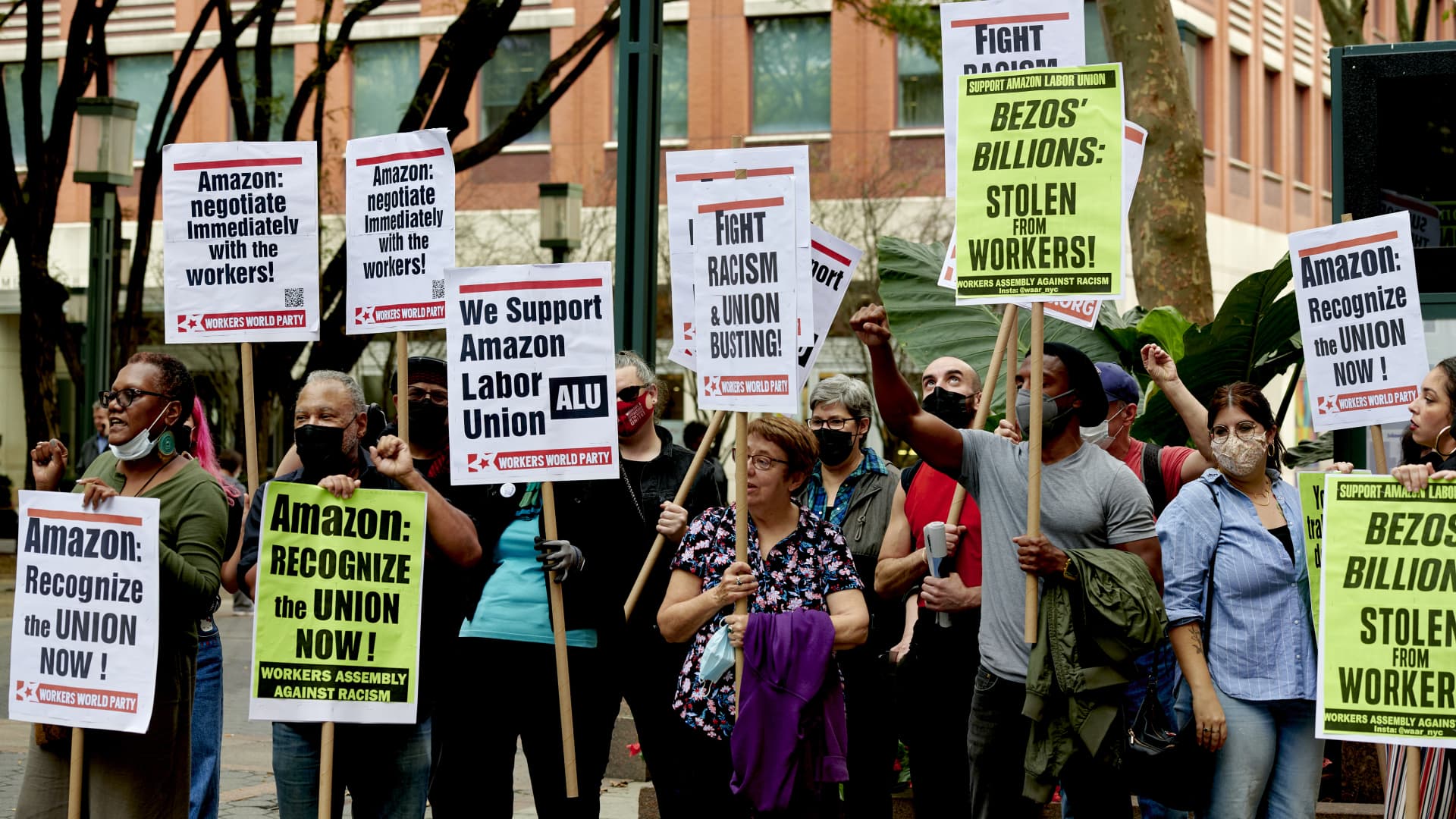
Employees at an Amazon warehouse on New York’s Staten Island voted to join a union on Friday, a groundbreaking move for organized labor and a stinging defeat for the e-commerce giant, which has aggressively fought unionization efforts at the company.
While the official vote tally hasn’t been announced, the union’s union’s lead is large enough that remaining and contested ballots are unlikely to sway the outcome of the election. The latest tally, according to a union organizer, is 2,350 in favor of joining and 1,912 opposed.
The Staten Island facility, known as JFK8, employs roughly 6,000 workers. It’s the first time an Amazon facility in the U.S. has successfully voted to unionize. The election result still needs to be formally certified by the National Labor Relations Board.
The projected outcome marks a setback for Amazon, which has invested heavily in touting its own benefits over those offered by unions. Amazon papered the walls at JFK8 with banners that proclaimed “Vote No,” set up a website and held weekly mandatory meetings. It even hired an influential consulting and polling firm with close ties to Democratic political groups.
By voting in the Amazon Labor union, Staten Island workers could challenge Amazon’s current labor model, which is the backbone of its Prime two-day shipping promise. Unions stand to disrupt the level of control that Amazon exerts over its warehouse and delivery employees, like their ability to unilaterally set the pace of work and hourly wages, labor experts previously told CNBC.
The ALU has called for Amazon to put in place “more reasonable” productivity rates in the warehouse. It’s also urging the company to raise wages, as well as give workers more paid breaks and vacation, among other demands.
The ALU was an unlikely contender to win the first unionized Amazon warehouse. Started in 2021, it’s a grassroots, worker-led organization that’s largely depended on crowdsourced donations from a GoFundMe account to fund organizing activities.
ALU is led by Christian Smalls, a former JFK8 manager, who was fired by Amazon in 2020 after the company claimed he violated social distancing rules. Smalls argued he was fired in retaliation for staging a protest in the early weeks of the coronavirus pandemic to call for stronger safety measures.
Smalls quickly became a leader of worker activism at Amazon and elsewhere. He spoke out at rallies criticizing Amazon’s labor record, and at one memorable protest, set up a guillotine outside Amazon founder Jeff Bezos’ Washington, DC, mansion to call for higher wages.
Amazon executives took notice of Smalls’ activism. A leaked memo obtained by Vice revealed David Zapolsky, Amazon’s general counsel, had referred to Smalls as “not smart or articulate” in a meeting with the company’s top executives, an incident that further angered critics of Amazon’s labor practices.
Amazon still faces another labor battle at its Bessemer, Alabama warehouse. The NLRB called for a do-over election last November after it determined Amazon improperly interfered in the first election, which was held last spring.
Worker activism inside Amazon has surged since the coronavirus pandemic hit the U.S. in early 2020. Before the first election in Bessemer, the last substantial union vote at a U.S. Amazon facility took place at a Delaware warehouse in 2014, when a group of repair technicians voted 21 to six against joining the International Association of Machinists and Aerospace Workers.
The vote tally in Bessemer wrapped up on Thursday, but the outcome is still too close to call. There were 993 votes opposing the union and 875 in favor. The outcome hinges on some 416 ballots remain that remain challenged by Amazon and the RWDSU. The NLRB will set a hearing in the coming weeks to determine whether the ballots will be opened and counted.




